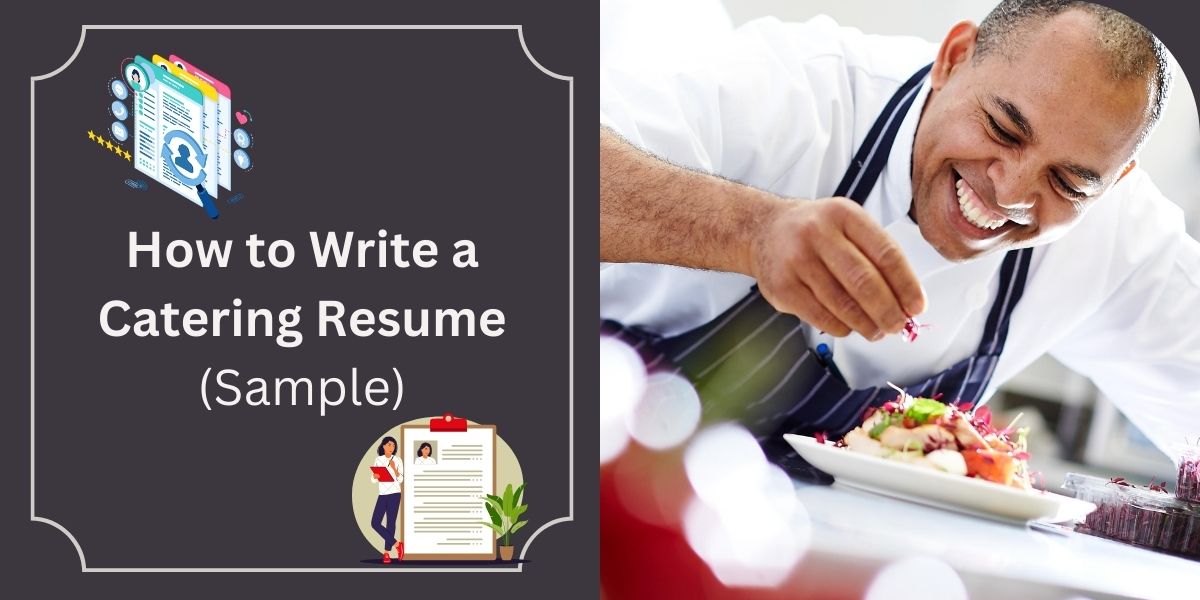Are you ready to showcase your catering skills and experience in a compelling resume? Crafting a compelling catering resume for 2024 requires a strategic approach to showcase your skills, experience, and passion for the culinary industry.
Before diving into resume writing, it’s crucial to understand the role of a catering professional. They must have excellent organizational skills, attention to detail, and a strong culinary background to succeed in this field.
If you’re applying for a catering position, it’s important to submit a resume that highlights your unique and relevant skills and experience in the catering industry. In this article, we will explain how to write a catering resume and provide a sample template.
What is a caterer?
Caterers prepare and serve a large quantity of food during gatherings. They also develop timetables and food plans for each event, gather all essential materials and utensils, and interact with catering personnel and attendees.
Their day-to-day tasks may include:
- Creating menus
- Setting up serving stations
- Handling special requests from guests and clients
- Adhering to health and safety guidelines
- Coordinating serving patterns
- Setting up and maintaining food stations or buffets
- Arranging tables and chairs in the event space
- Communicating and managing waitstaff
While caterers oversee the general operations of an event, they rely on catering servers and staff to ensure the event runs smoothly.
Catering servers are responsible for serving food and drink, answering guest’s questions about menu items, maintaining buffet supplies, and ensuring guests have a unique dining experience.
The daily duties of a catering server may include:
- Set up tables, linens, and chairs in the event space
- Greet and welcome guests and respond to questions
- Serve food and beverages in a designated order and in a timely manner
- Reset banquet as specified by supervisor
- Clear and clean dining tables between courses
- Check with guests to ensure satisfaction
How to write a catering resume
An effective catering resume focuses on relevant experience, education, and abilities. Creating an effective and relevant CV will help you become a more competitive applicant and boost your chances of getting an interview. To write a catering resume, follow these steps:
1. Provide your contact information
Add your full name, address, phone number, and email address at the top of your resume. Depending on your preferences, you can add your full address or just the city and state.
2. Write an objective
Right below your contact information, include an objective that states your best qualities and what you hope to achieve with a new employer. Try to keep your objective to two sentences at most, and tailor it to each application.
Making your objective specific to the employer can show your interest in the job and your attention to detail. If you can, include the name of the specific catering company and mention how your goals align
3. List your relevant experience
Starting with the most recent, list your relevant work history. Include the employer, your position, and the dates you worked.
Then list your main responsibilities and duties within the position. Try to use active words and emphasize the responsibilities that align with the open position.
If you can, include numbers that help hiring managers learn more about your catering experience. For example, a responsibility could be, “Worked average of six 100-person events per week.
4. List your education and certifications
Start with your most recent or highest education first, including the school name, degree, or certification and the date you earned it.
You can also list any catering, food-handling, or culinary certifications you hold in your education section. If you want your certifications to stand out, you can create a separate section for them.
5. Highlight your skills
List five to ten skills that are most relevant to the job. This can include soft skills, like customer service and teamwork, and hard skills, like knowledge of safe food handling.
It’s also useful to integrate power words in this segment, or words that evoke strong positive emotions in the reader.
For example, instead of “knowledge of food and beverage serving standards,” try “exceptional knowledge of food and beverage standards.
Catering resume template
To create a successful catering resume, begin with a standard template. Add your own information to this catering resume example:
[Your name]
[Address]
[Phone number]
[Email address]
Objective
[Briefly explain your current professional status, number of years of experience, and why you’re applying for the position.]
Education
[School name] | [Location]
[Degree or certificate]
[Awards or achievements][School name] | [Location]
[Degree or certificate]
[Awards or achievements]
Experience
[Employer name] | [Location]
[Title], [Dates worked]
- [Responsibility or achievement]
- [Responsibility or achievement]
- [Responsibility or achievement]
[Employer name] | [Location]
[Title], [Dates worked]
- [Responsibility or achievement]
- [Responsibility or achievement]
- [Responsibility or achievement]
Skills
- [Skill]
- [Skill]
- [Skill]
Catering resume sample
Here’s a catering resume sample to help you get started
Jenny Bowman
324 Main street
555-123-4567
Objective:
I am seeking a challenging position as a catering professional where I can utilize my culinary expertise, event planning skills, and passion for delivering exceptional dining experiences to contribute to the success of this company.
Professional Experience:
Johnson Group Catering | Detroit, MI
Catering manager, June 2020–present
- Managed catering operations for events ranging from intimate gatherings to large-scale weddings and corporate functions.
- Developed customized menus based on client preferences and dietary restrictions, resulting in a 15% increase in customer satisfaction.
- Coordinated with vendors and suppliers to ensure timely delivery of ingredients and equipment for events.
- I trained and supervised catering staff, maintaining a high level of professionalism and efficiency during service.
- Received positive feedback from clients for exceptional service and attention to detail.
Sparkle Events | Ann Arbor, MI
Catering manager, January 2015–May 2019
- Planned and executed catering services for high-profile events, exceeding client expectations and generating repeat business.
- Managed event budgets, achieving cost savings of 10% through strategic procurement and resource allocation.
- Implemented food safety protocols to maintain compliance with health and safety regulations.
- Collaborated with event planners and vendors to create seamless experiences for guests.
- Led a team of catering staff in delivering exceptional service and maintaining a positive brand image.
Skills:
- Culinary expertise in menu planning, food preparation, and presentation.
- Strong organizational and time management skills.
- Excellent communication and interpersonal abilities.
- Knowledge of food safety and sanitation regulations.
- Proficiency in event planning and coordination.
- Ability to work effectively under pressure in fast-paced environments.
Education:
University of South Michigan, Ann Arbor, MI
Bachelor of Science in Business
GPA: 3.7Michigan School of Culinary Arts | Detroit, MI
Certifications:
- Certified Professional Food Manager (CPFM)
- ServSafe Food Handler Certification
What are the most in-demand skills found in a catering resume?
Catering uses a variety of skills. While all these skills are not required, these are some hard and soft skills you may want to mention on your resume.
Hard Skills
- Exceptional culinary knowledge: to ensure quality and make informed decisions.
- Experience in menu planning: for creating diverse and appealing menus.
- Budgeting skills are essential for cost management and profitability.
- Knowledge of POS software is essential for efficient order management and billing.
- Understanding food regulations: ensuring compliance and safety.
- Event planning experience is critical for the successful execution of catered events.
- Vendor management: To handle suppliers effectively.
- Knowledge of dietary restrictions: To accommodate all guests’ needs.
- Wine and beverage knowledge: to pair beverages with meals effectively.
- Experience with catering software: for efficient planning and execution of events.
- Familiarity with event themes and styles: To match the event’s ambiance.
- Experience in staff training and supervision: To ensure top-notch service.
- Knowledge of table setting and decor: To create an appealing dining environment.
- Experience in cost control: To maximize profitability.
- Knowledge of current food trends: To keep the menu up-to-date.
- Experience in high-volume catering: Demonstrates the ability to handle large-scale events.
Soft Skills
- Effective communication is essential for coordinating with staff and client interactions.
- Multitasking ability: Ability to handle multiple tasks simultaneously.
- Exceptional customer service: To ensure client satisfaction.
- Teamwork: Ability to work cooperatively with diverse teams.
- Problem-solving skills: To address issues efficiently and effectively.
- Creativity: Brings innovation to menu creation and event planning.
- Leadership: Ability to guide and motivate the team.
- Attention to detail ensures high standards are met in every task.
- Stress management: ability to perform well under pressure.
- Flexibility: Can adapt to changing circumstances and demands.
- Time management ensures timely preparation and service.
- Negotiation skills are useful for dealing with vendors and clients.
- Decision-making ability: Makes informed choices quickly.
- Empathy: understands and caters to clients’ needs and emotions.
- Initiative: Proactively addresses tasks and challenges.
- Conflict resolution: handles disputes calmly and effectively.
- Patience: maintains composure in challenging situations.
- Dedication: committed to providing exceptional service.
- Resilience bounces back from setbacks.
- Passion for the Industry: Love for food and service enhances performance.
What work experience and other accomplishments should be on your catering resume?
Include any of the following experiences and accomplishments you have:
- Experience in high-volume catering: The candidate should have experience managing large-scale events, demonstrating their ability to handle high-pressure situations.
- Track record in leading teams: We want to see evidence of successfully leading a team, improving staff performance, and maintaining high morale.
- Successful budget management: We value candidates who can provide examples of effective budget management, showing how they’ve improved profitability.
- Proven customer satisfaction: Testimonials or data indicating high levels of customer satisfaction would be an advantage.
- Innovation in menu creation: Examples of creativity and innovation in menu planning, particularly for high-profile events, will be highly regarded.
Tips for writing a catering resume
- Tailor your application: Every company and role is unique, so ensure your resume and cover letter are customized for each application. Highlight relevant skills, experiences, and accomplishments that align with the job description.
- Showcase your expertise: Use niche-specific language to demonstrate your industry knowledge. For instance, discuss your experience in menu planning, cost control, staff training, or event coordination.
- Leverage your network: Many opportunities in the hospitality industry come through word-of-mouth. Reach out to your contacts, attend industry events, and consider joining professional organizations.
- Use testimonials: If you have positive feedback from previous employers, clients, or colleagues, include these in your application or portfolio. They can significantly enhance your credibility.
- Focus on solutions: Hiring managers are looking for problem-solvers. Be ready to share examples of challenges you’ve overcome, solutions you’ve implemented, and the positive results you achieved.
- Emphasize your experience: In the hospitality industry, hands-on experience often speaks louder than qualifications. Highlight your practical experience in your application and during interviews.
- Stay current: The hospitality industry evolves quickly, so staying informed about the latest trends and best practices is essential. This knowledge can give you an edge over other candidates.
- Quantify your achievements. Whenever possible, use statistics to illustrate your accomplishments. Did you increase event bookings by 20%? Or reduce food waste by 15%? These numbers can make your achievements more tangible and impressive.
Conclusion
Creating an effective catering resume is essential for showcasing your expertise and landing your desired job in the food service industry.
By following the expert tips provided and using our sample template as a guide, you can craft a compelling resume that stands out to hiring managers.
Remember to customize each resume for the job you’re applying for and highlight your unique skills and achievements.




 Jobi.ng
Jobi.ng



